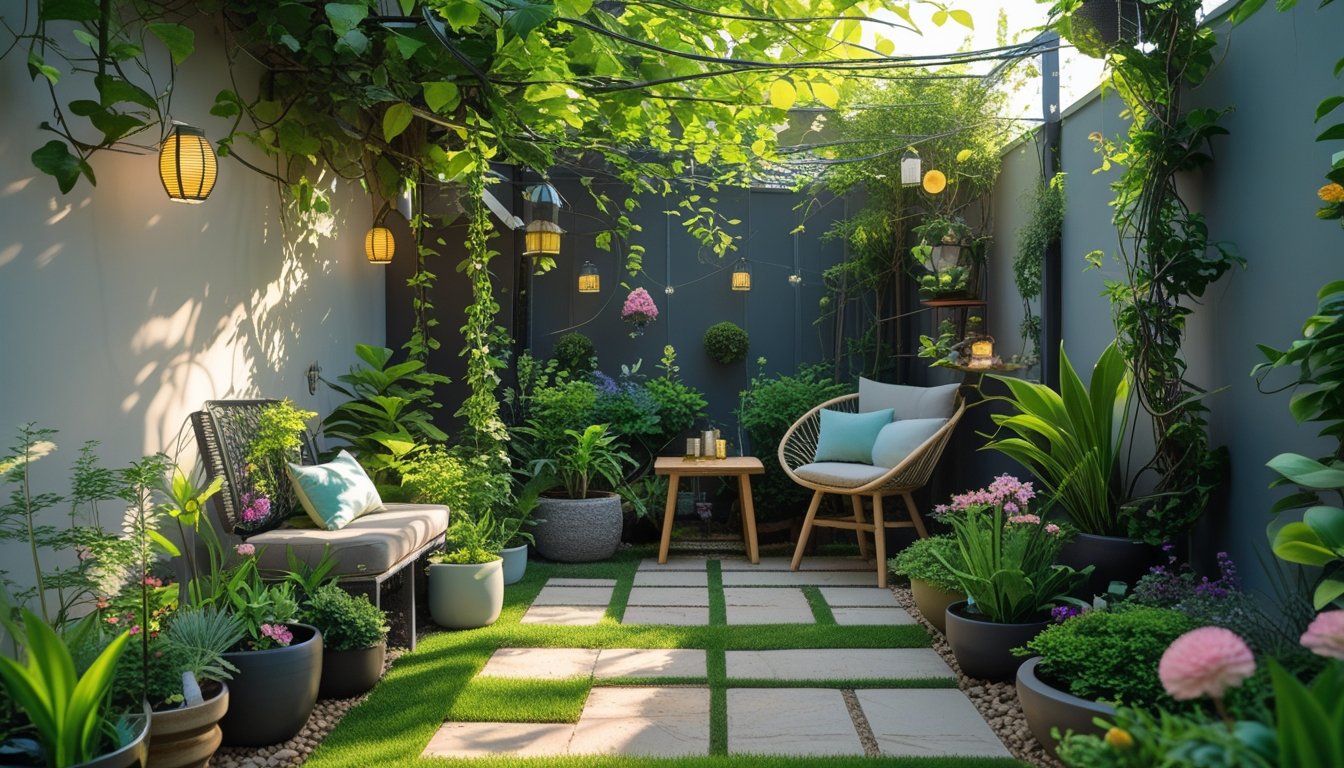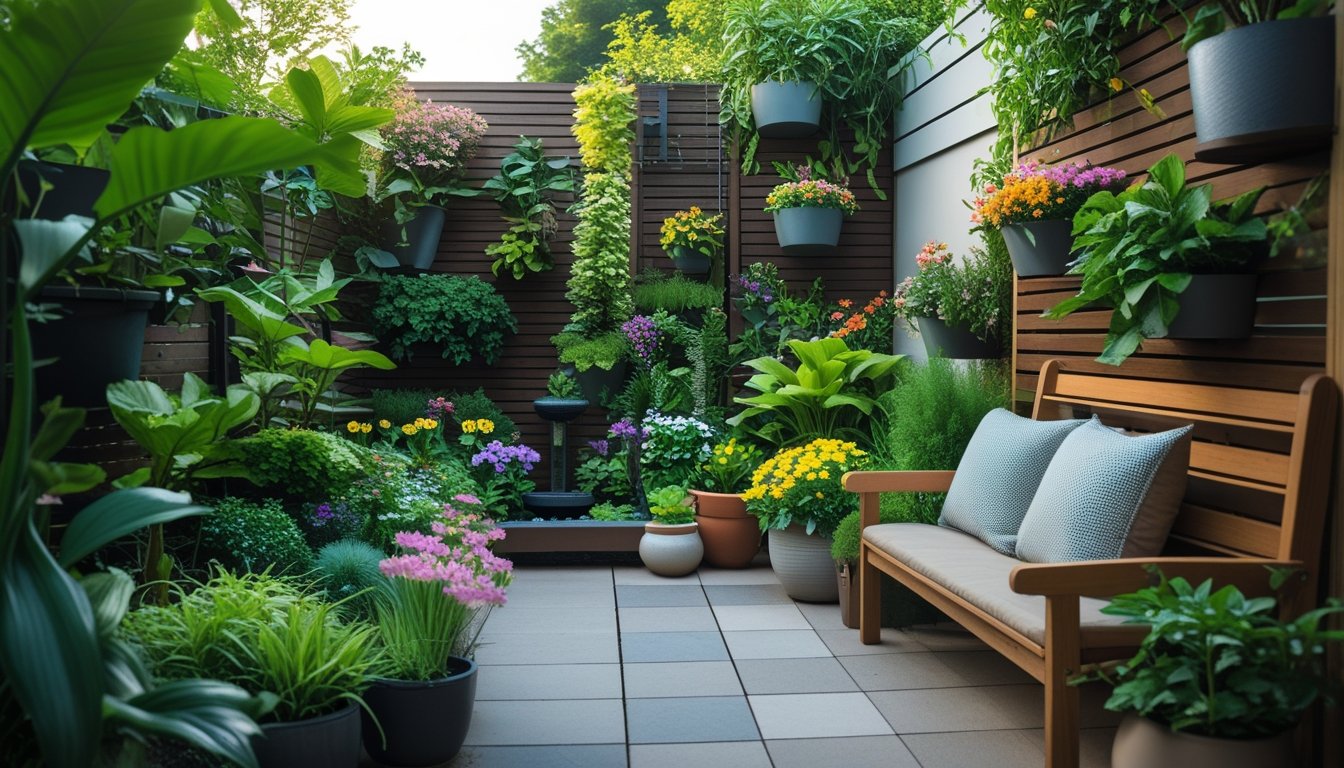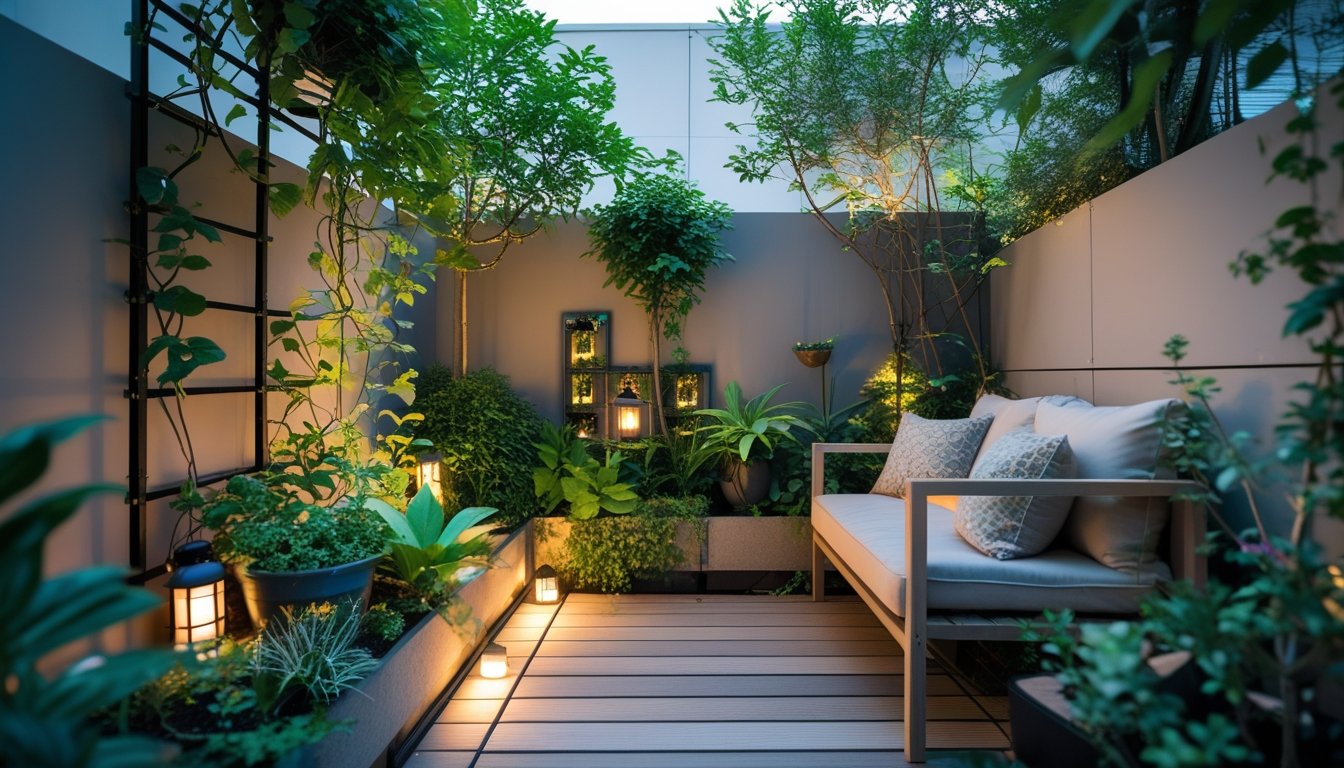Late updated: 25 Jul 2025 14:07
Written by: James Whitaker
Small Garden Spaces Creative Design Solutions For Relaxation: Transforming Your Outdoor Retreat
Creating a small garden space that seamlessly combines relaxation with creative design may seem daunting, but with the right approach, it's entirely achievable. Through smart design strategies and thoughtful planning, we can transform even the tiniest outdoor area into a tranquil retreat. Whether it's a petite patio or a small balcony, enhancing these spaces with multifunctional elements and innovative design can lead to a calm and inviting environment.

By incorporating vertical gardens, space-saving plants, and clever lighting, we introduce layers and dimension into compact areas. These features not only elevate the aesthetic value but also contribute to a serene atmosphere. Our goal is to guide readers through an array of ideas that optimise limited spaces without compromising on style and comfort.
The possibilities for maximising small garden spaces are boundless, and with a dash of creativity, we can unlock the potential of any outdoor area. Whether our tastes lean towards a lush green paradise or sleek minimalist design, small gardens can offer us moments of peace and beauty right at our doorstep.
Key Takeaways
- Innovative design and smart strategies can transform small gardens.
- Layering with vertical gardens and lighting creates depth and ambience.
- Thoughtful design balances aesthetics and functionality.
Essential Design Strategies for Small Garden Spaces

In small garden spaces, maximising every inch is crucial to creating a beautiful and functional environment. We explore strategies such as using vertical space, employing creative container solutions, and selecting multifunctional furniture to transform these areas into serene retreats.
Maximising Vertical Space with Creative Structures
Vertical gardening is an excellent approach to optimise limited space in small gardens. By using structures like trellises and wall-mounted planters, we can cultivate climbing plants and transform plain walls into lush vertical gardens.
Hanging planters and window boxes are ideal for adding layers of colour and texture. These allow for the display of cascading flowers or culinary herbs, perfect for a balcony garden. Incorporating vertical gardens not only enhances beauty but also boosts the greenery without occupying valuable ground space.
Innovative Container and Raised Bed Solutions
Container gardening in small spaces offers flexibility and versatility. Potted plants and hanging planters provide an opportunity to grow diverse plants, adding depth with varying heights and colours. Containers can be moved and rearranged, allowing us to make the most of sunlight and other environmental factors.
Raised beds can be constructed in narrow spaces for concentrated growth. They offer advantages like improved drainage and easier access. Raised beds are particularly suitable for growing dwarf fruit trees or miniature trees, allowing us to enjoy a small orchard in a confined area.
Functional Seating and Multi-Purpose Furniture Ideas
Utilising multifunctional furniture is key to creating a practical and enjoyable small garden. Foldable tables and chairs provide flexible seating arrangements, essential for hosting or relaxing. Consider using benches with hidden storage to maximise utility without cluttering the space.
Selecting items that serve multiple functions can transform a patio into a dining area or reading nook. Multi-purpose furniture helps us maintain open areas for movement and activities while still providing comfort and visual appeal. By prioritising functional design, we can ensure our small garden remains a comfortable and inviting haven.
Creative Elements for Relaxation and Ambience
Our outdoor retreats can be transformed by weaving creative features that invite peace and aesthetic pleasure. Integrating elements such as water features or artful lighting can redefine these spaces. DIY projects also add personal touches that reflect individual styles and meet unique needs.
Incorporating Water Features and Zen Gardens
Water features, whether a small fountain or a gentle stream, provide a soothing backdrop for relaxation. Their soft, rhythmic sounds can create a tranquil environment, crucial for unwinding after a long day. Incorporating a Zen garden elevates this atmosphere, with minimalist designs fostering mindfulness through simplicity.
Zen gardens typically use elements like stones, sand, and moss. Thoughtful placement of these materials encourages contemplation and invites us to engage mindfully with our surroundings. Small seating areas, made from natural materials, enhance this peaceful space while maintaining harmony with the overall design. Water features and Zen gardens can redefine urban gardens, transforming them into calming retreats.
Transformative Lighting for Garden Atmosphere
Lighting in gardens plays an essential role in shaping evening ambience. By using string lights and fairy lights, we can craft a magical atmosphere. These lights introduce a warm, inviting glow, perfect for intimate gatherings or moments alone.
For added charm, solar lanterns provide eco-friendly illumination while enhancing decorative appeal. Properly placed, lighting outlines pathways, highlights climbing vines, and enhances seating areas. Seasonal decor can integrate additional themed lighting, ensuring our gardens are vibrant and captivating throughout the year. Thoughtful lighting selections breathe life into garden designs, emphasising both functionality and aesthetic allure.
Enhancing Small Gardens with DIY Projects and Décor
DIY projects allow us creative freedom to personalise our gardens. From vertical planters to recycled seating, these initiatives optimise small spaces while adding unique touches. For instance, vertical gardens maximise plantable area, supporting both decorative vines and practical edible plants.
Incorporating vintage elements like antique watering cans or rustic benches contributes a nostalgic charm. Building our own features such as birdbaths or simple trellises can merge function with beauty. These projects offer not only aesthetic benefits but also fulfilment through hands-on involvement, turning every element of our gardens into a reflection of our personal style and preferences.
Frequently Asked Questions

Creating a small garden space that offers relaxation requires careful planning and practical solutions. We will explore incorporating elements of Zen gardens, budget-friendly strategies, and Japanese-inspired designs for a peaceful retreat. For those with creative skills, we'll suggest DIY projects that enhance serenity.
How can one incorporate elements of a Zen garden into limited outdoor square footage?
To add Zen elements, consider features like raked gravel patterns, small water basins, and minimalist plantings. Compact sandboxes can replicate traditional Zen gardens. Strategically placed stones or pebbles add texture without taking up much room, promoting a sense of peace.
What budget-friendly strategies are available for creating a relaxing garden oasis?
Utilising cost-effective materials such as reclaimed wood for garden furniture or recycled bricks for pathways offers sustainable solutions. Opting for perennial plants reduces maintenance costs while using solar lighting provides both ambience and energy efficiency.
What are the essential components for designing a small Japanese-inspired garden?
In small spaces, focus on key elements like a water feature, gravel beds, and traditional plants such as bamboo or ferns. Utilise space by creating layered plantings and incorporating Japanese lanterns for authentic touches.
How can you design a tranquil garden area in the front yard of a home?
Designing front yard tranquillity involves creating pathways that meander subtly and adding layered greenery with shrubs and flowering plants. Incorporating a bench or a small seating nook invites relaxation. Fencing or hedging can provide privacy, ensuring a peaceful environment.
What do-it-yourself projects can enhance the serenity of a compact garden space?
DIY projects such as building a simple water feature or crafting small wooden planters can transform your garden. Creating mosaic stepping stones or homemade lanterns adds unique and personal touches. These projects can enhance tranquillity and reflect personal style.
What are some modern approaches to Zen garden aesthetics that suit small areas?
Utilising vertical gardens and wall-mounted planters can mimic the natural vertical landscape found in Zen gardens. Incorporating sleek, modern materials such as steel or concrete alongside traditional elements like water adds contemporary flair to Zen design principles for small spaces.
